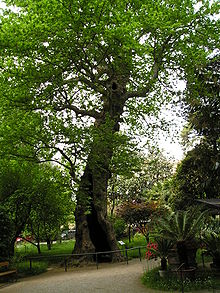- Ombra mai fu
-
"Ombra mai fu" is the opening aria from the 1738 opera Serse by George Frideric Handel.
Contents
Context
The opera was a commercial failure, lasting only five performances in London after its premiere. In the 19th century, however, the aria was rediscovered and became one of Handel's best-known pieces. Handel adapted the aria from the setting by Bononcini who, in turn, adapted it from the setting by Francesco Cavalli. All three composers had produced settings of the same opera libretto by Nicolò Minato.
Music
Originally composed to be sung by a soprano castrato (and sung in modern performances of Serse by a countertenor, contralto or a mezzo-soprano), it has often been arranged for other voice types and instruments, including solo organ, solo piano, violin and piano, and string ensembles, often under the title "Largo from Xerxes", although the original tempo was larghetto.
In the opera, the aria is preceded by a short recitativo accompagnato of nine bars, setting the scene ("Frondi tenere e belle"). The aria itself is also short; it consists of 52 bars and typically lasts about four minutes.
The instrumentation is for a string section: first and second violins, viola, and basses. The key signature is F major, the time signature is 3/4 time. The vocal range covers C4 to F5 with a tessitura from F4 to F5.
Words
The title translates from the Italian as "Never was a shade". It is sung by the main character, Xerxes I of Persia, admiring the shade of a plane tree.
Frondi tenere e belle
del mio platano amato
per voi risplenda il fato.
Tuoni, lampi, e procelle
non v'oltraggino mai la cara pace,
nè giunga a profanarvi austro rapace.
Ombra mai fu
di vegetabile,
cara ed amabile,
soave più.Tender and beautiful fronds
of my beloved plane tree,
let Fate smile upon you.
May thunder, lightning, and storms
never bother your dear peace,
nor may you by blowing winds be profaned.
A shade there never was,
of any plant,
dearer and more lovely,
or more sweet.Cultural references
Performances of this aria are included in several movies. A fully staged version appears in the film Farinelli (1994), a fictionalized biography which recounts the tumultuous relationship between Handel and the famed castrato Farinelli. The piece is also featured in Dangerous Liaisons (1988), in the original Italian, and Pride and Prejudice (TV version, 1995), which used English language lyrics. Given the setting of these two movies/novels (1780s France and England in the early 19th century), when "Ombra mai fu" was still in obscurity, inclusion of these performances, while not technically anachronistic, would probably not have been recognized by contemporary audiences.
On 24 December 1906, "Ombra mai fu" may have been the first music to have been broadcast by radio.
External links
- Free scores of "Ombra mai fu" in the Choral Public Domain Library (ChoralWiki)
- "Ombra mai fu": Free scores at the International Music Score Library Project.
- "Ombra mai fu" at The Aria Database
Categories:- Arias by George Frideric Handel
- Opera excerpts
- 1738 works
Wikimedia Foundation. 2010.

